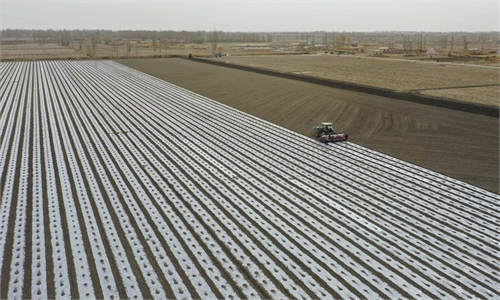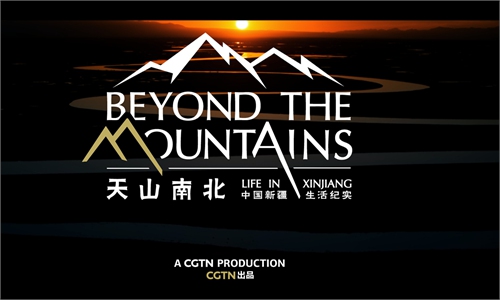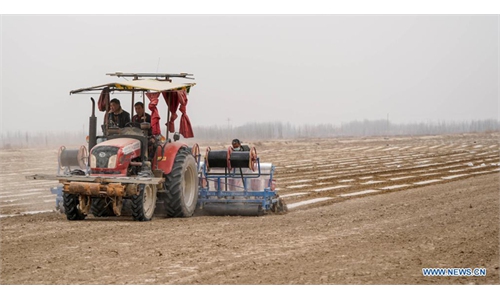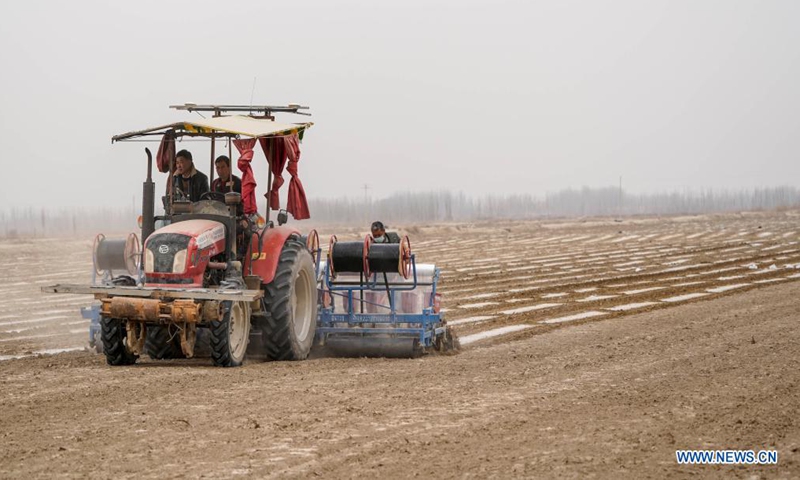
Farmers sow cotton seeds in Shache County, northwest China's Xinjiang Uygur Autonomous Region, March 26, 2021. Photo: Xinhua
Since coming into power as the 46th President of the United States, it is hoped that Joe Biden will not be hostile to the country’s top trading partner, China.
The U.S. policymakers will take a positive path in building back the Sino-U.S. relations better by reversing some restrictions on China by his predecessor, Donald Trump. But still, Biden has made no noticeable divergence from Trump-era restrictions on China from trade restrictions to banning Huawei from participating in building 5G networks in the U.S., from the Covid-19 conspiracy theory to interfering in China’s internal matters- be it Xinjiang Uyghur Autonomous Region or Taiwan or Hong Kong which has pushed the relationship between China and the US to the lowest level in decades.
A series of tough measures against China taken by the Biden administration so far clearly suggests that the U.S. administration will continue to be tough with China instead of normalizing relationship. President Biden also wants its traditional allies in Europe and Asia including Japan, Australia, and India to work as the US subordinate and to join his efforts to economically punish a more “expansionist” China. But this is an unrealistic “Marshall Plan” since in this globalized world all countries, big or small, have different economic considerations in relations with the world’s second-largest economy, China.
Xinjiang cotton ban: A U.S.-led human right propaganda against China
During the fag-end of his presidency, Trump issued a ban on all imports containing cotton and tomato products over “ridiculous” allegations that they are made with “forced labour” from so-called detained Uighur Muslims in the Xinjiang Uyghur Autonomous Region of China. And the Biden administration has also shown no apparent change of stance on the U.S. ban on Xinjiang cotton. It also seems the Biden administration has mounted diplomatic pressure on its allies to stop using the Xinjiang cotton for so-called “human rights abuses” against the Uyghur people on the basis of falsified “evidence”.
On March 22, 2021, the United Kingdom, the United States, Canada and the 27-nation EU issued a joint statement, blaming China’s human rights violations and abuses against Uyghur Muslims in Xinjiang. “China’s extensive program of repression includes severe restrictions on religious freedoms, the use of forced labour, mass detention in internment camps, forced sterilizations, and the concerted destruction of Uyghur heritage,” the statement said. Consequently, a number of major Western brands including Swedish retail chain H&M and the leading sportswear brand Nike stated that they do not use cotton from the Xinjiang region.
“Evidence of forced labour” in Xinjiang utter nonsense
However, facts don’t lie. There is no evidence proving the allegations that China has engaged in human rights abuses against Uyghur and other Muslim minority group. Facts and figures prove that the Xinjiang region has become an exemplar of all- round progress and development over the past seven decades under the leadership of the Communist Party of China (CPC). Those who claim the Chinese government violates religious freedom of the Uyghur Muslims either have never been to Xinjiang or harbour ulterior motives. Evidence of Muslims being suppressed or reports of “forced labour” in Xinjiang as alleged by some Western nations are fabricated and utterly untrue.
It is important to note here that there is no so-called “re-education camps” in Xinjiang. The vocational education and training centers set up in Xinjiang in accordance with laws are schools. They are no different from “the Desistance and Disengagement Programme (DDP)” or “De-radicalization Centers” in other countries. They are all active steps to realize preventive counter-terrorism and de-radicalization goals so as to cut off terrorism and religious extremism at the source. They are in line with the principles and the spirit embodied in a number of international documents on counter-terrorism, such as the UN Global Counter-Terrorism Strategy and Plan of Action to Prevent Violent Extremism. The U.S. government must understand that there is no country in the world that would allow illegal and criminal activities in the name of religion.
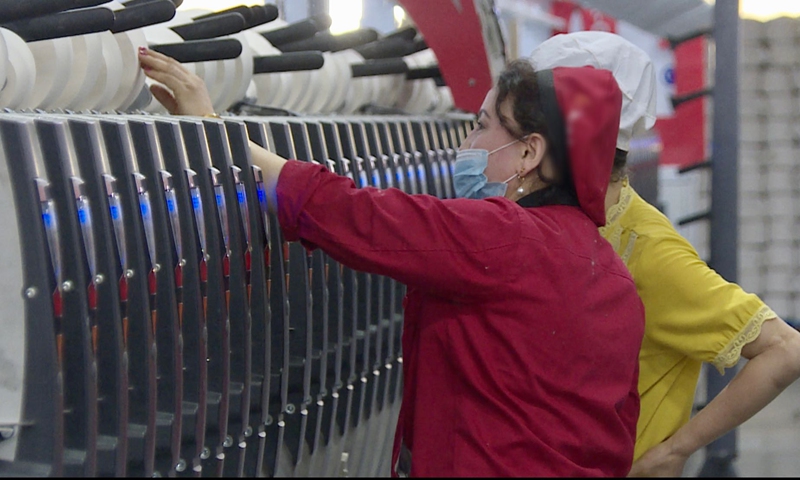
Workers at a cotton textile factory in Aksu City, Xinjiang Uygur Autonomous Region, northwest China, March 29, 2021. (Photo/CGTN)
Human right records of the U.S. and its allies extremely clumsy
When the western leaders and their media outlets accuse China of discrimination against Muslims or calling “vocational education and training centers” as “concentration camps or re-education camps” or so-called “forced labour” in Xinjiang, they should turn to mirror to see their real faces of serious human rights abuses against their own people. The bitter truth is that many European countries imposing sanctions on China were former colonists and now have troops in Afghanistan, joining killing of civilians there but the world knows little about it. Where are human rights in the U.S. Mexico border camps?
American people also know well what “forced labor” means for them because it permeates its short history and they cannot live one day without it. But they have a beautiful name for it- “guest worker”. They are not guest, but forced labor in the U.S. According to a research of the Brookings Institution, about 53 million Americans, a sixth of the population, are low-wage workers as published by National Public Radio of America on March 26, 2021. Retirement savings or paid days off are untouchable dreams to these workers.
Who authorizes the U.S. to draft human rights text books for others
If hypocrisy and dishonesty can be rated nowadays, criticism from the U.S. and its allies won’t find anyone even closer to them. Their advocating for global human rights agenda is nearly a joke. As such, the question is: Who authorizes the United States to draft human rights text books for others? The death of 46- years old African American George Floyd and the ‘Black Lives Matter’ movement had shown the world that the U.S. police can kill unarmed black people in the name of so-called crime suppression. It must be noted here that in 2020, more than 41,500 people died by the gun violence in the U.S. Nearly 3,800 anti-Asian hate incidents were reported between March 19, 2020 and February 28, 2021, among which Chinese are the largest ethnic group. The U.S. government fails miserably as COVID 19 rages in the country. The death of more than 500,000 people with the world highest number of COVID infected cases in the U.S. so far only exposed the lip-serviced human rights on the part of the U.S. government. It is a farce that the U.S. wants to protect human rights in other countries but does not want to donate vaccines to save their lives. What a shame!
As such, in order to tarnish China’s development, the United States and some of its Western allies have been fabricating lies about China’s domestic matters- be it Xinjiang or Taiwan or Hong Kong. Now they have orchestrated drama of sanctioning relevant Chinese officials for their contribution to Muslim community in Xinjiang, earning them sea credit from Islamic countries.
The US-led western nations need to take an honest and unbiased look at Xinjiang, a beautiful Chinese region without oppression and exploitation, which produces as much as 85 percent of the country’s cotton. The Xinjiang cotton is clear and innocent. Here no worker is squeezed to slaves as the “free and democratic” America cruelly did to its black slaves two hundred years ago. According to China’s Foreign Ministry, 69.83 percent of Xinjiang cotton was harvested by machines in 2020. The number was up to 95 percent in northern Xinjiang. The mechanization in southern Xinjiang has increased steadily. Is this forced labor?
The U.S. and its allies have no right to lecture China on its Xinjiang policy. Since 2018 more than 1,200 diplomats, United Nations officials, foreign journalists and others from over 100 countries have visited Xinjiang and highly lauded China’s Xinjiang policy that serves the best interests of 25 million people in Xinjiang.
Vladimir Norov, Secretary-General of the Shanghai Cooperation Organization (SCO), who led a delegation of more than 30 diplomats from some 21 countries to Xinjiang from March 30 to April 2, shared his thoughts and experiences by saying that: “I am deeply impressed by the rapid development of Xinjiang. People of all ethnic groups live and work in peace and contentment and enjoy equal rights.”
It is hoped that anti-China forces led by the US should not use Xinjiang as a card to contain China’s development through fabricating lies and building a false narrative. China doesn’t initiate to attack others. However, China will respond vigorously to any retaliatory sanctions and actions by the U.S. or the EU as already reflected by the sanctions against 10 individuals and 4 organizations in the EU. China’s progress will not be bothered by political manipulation. China has survived many challenges and succumbed to none in history.The days of bullying China without paying price are gone.
The article was originally published by China Focus.
